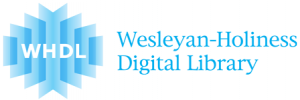 Katie King, SNU Library Director
Katie King, SNU Library Director
Almost two years ago, I received an invitation from Nazarene headquarters to come and chat with other Library Directors about the feasibility of creating a digital library for the denomination. I wish I could tell you that I foresaw what was going to come out of that meeting, but I honestly thought, “Oh dear. This is probably going to be boring and may or may not be useful.” I decided to attend the meeting out of a desire to be participatory, and I’m so glad I did.
What I found was a group of passionate and competent people who wanted to come together to creatively solve a global Nazarene problem: a lack of pastoral, training and scholarly resources. For three days, we spent our time together laying the foundation and casting the vision for what is the Wesleyan-Holiness Digital Library (WHDL), and it officially went live on May 30, 2013!
So, what is the WHDL? It’s a liberal-arts library that provides free, open-access online resources in multiple languages to support scholarship, research, ministerial development and life-long learning in the Wesleyan-Holiness tradition. So what does that actually mean? First, most everything in the WHDL is free and is easily accessible from the Internet in an easily-downloadable format. The site itself is available in the top 5 most-populous Nazarene languages, and individual resources are available in as many languages in which we have them.
The material currently in the WHDL focuses on Course of Study content (ministerial training and preparation coursework offered by the Nazarene denomination) since the initial funds for the WHDL came from the Books for Pastors Taskforce (their mission is to get pastors the books and other resources they need to continue learning), but we are also adding secondary sources, archival material, current publications, scholarship, etc.. Soon, the WHDL will also feature SNU-specific contributions, including some of the excellent work you do as students!
I’m really excited about this work because it’s cooperative, interesting, challenging and it benefits SNU; I’m most excited, though, about what the WHDL means for the global church. For example, pastors in Fiji have a problem with books lasting over time due to Fiji’s high humidity levels. Well, last winter, pastors in Fiji received the WHDL downloaded onto tablets! Humidity problem solved. Another example: this radically changes how missionaries and laypeople are resourced in creative-access countries. Rather than smuggling Bibles and other books in a few at a time, a person can now smuggle copies of the entire WHDL in on flash drives. Awesome!
Final example: our sister universities sometimes don’t have enough money to buy resources to support the teaching and learning on their campuses, so professors lecture from their own knowledge, and students go without textbooks. Enter the WHDL, where we will be uploading material (for which we have copyright permissions) so professors and students can teach and learn in a more dynamic and better resourced way!
One of my esteemed colleagues, Lon Dagley (Computer Services Librarian at MidAmerica Nazarene University), said that this project is a game-changer for our time much like the Gutenberg press was for the 15th century (and the centuries that have followed), and he’s right. In the same way as the Gutenberg press made the communication of ideas via the printed word widely available (and changed societal structure), so the WHDL (and the foundational technologies that support it) is making Wesleyan-Holiness resources instantly available regardless of geography and, eventually, language.
I’m grateful to be a part of a team that’s moving the Nazarene church and other Wesleyan-Holiness denominations forward into the 21st century, and I’m excited to see how the SNU campus will support our work!